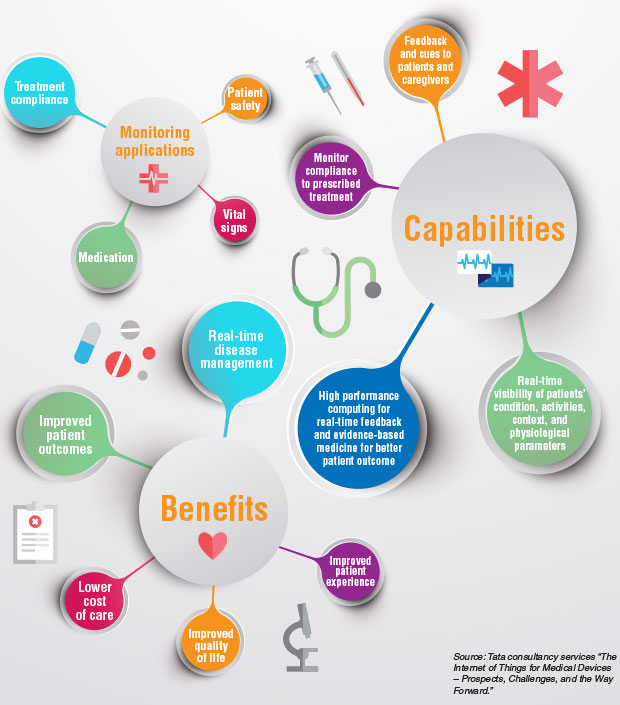The medical device future vision is promising. IoT can revolutionize healthcare industry, specifically, medical devices. Medical device manufacturers are uniquely positioned to be successful in this market as they have a profound understanding of the regulatory process, critical applications, and patient risk.
As medical device manufacturers, healthcare practitioners, and enthusiasts continue to embrace the benefits of technology in healthcare, it may be of interest especially for medical device manufacturers to explore the intersection of medical technology and IoT.
IoT connected devices will enable a new generation of medical devices capable of transmitting data on an ongoing basis. IoT will enable the medical community to perform deep data and data analytics, and, ultimately produce cost-effective products and services within all these sectors.

Preventive Care
According to the Centers for Disease Control, seven out of ten U.S. deaths are caused by chronic disease. Roughly half of the country’s population is diagnosed with a chronic illness such as heart disease, cancer, diabetes, or other ailments classified by the medical community as preventable.
The issue here is, people are not getting the feedback they need when they are proactive in making changes to their lifestyle. They have limited feedback on how the implemented changes are directly impacting their short- and long-term health goals.
IoT connected devices and home-based monitoring tools will become connected enabling the patient to have access to the data and make better health decisions. Unfortunately, the healthcare system follows a reactive model where action is only taken when illnesses occur
IoT devices have the potential to facilitate a directional shift from a reactive healthcare system to a more preventative healthcare system which can help people live healthier lives and deter illnesses while driving down costs.
Data Analytics
Data analytics provide an opportunity for IoT to positively impact the medical device industry. IoT devices should be designed to constantly push data, store and process it, and analyze it to look at variety of different metrics in order to make well-informed decisions.
The key challenge is to determine what data is relevant, how long to store it, and what data can be deleted. Otherwise, efficiency is compromised as an infinite pile of data is analyzed when only a small portion is useful. This is a very real challenge that will have to be addressed to preserve the efficiency of IoT connected devices.
IoT devices can also improve data analytics through their accuracy, speed, and plethora of transferable information. Data analytics would be achieved by devices and software.
Critical Care Response
Critical care response is most effective within a hospital where nurses are alerted via medical devices to help patients in distress. IoT devices will allow data to be transmitted to a remote location monitored by healthcare professionals who can expertly analyze the data.
One of the key issues of critical care response is the lack of information received by the critical response team in the event of an emergency. Machine intelligence and algorithms can be utilized to autodetect anomalies enabling data to be transmitted to the appropriate individual for a response.
In an Emergency Medical IoT system, the devices should send an alert and inform the Emergency Medical Technician (EMT) about the patient medical history so they can respond faster and more accurately.

Enabling Cost-Effective Product and Services
Cost-effective products and services can be achieved in a variety of ways with IoT connected medical devices. By shifting from a reactive healthcare industry to a preventative one, medical fees can decrease substantially.
There are two IoT aspects of cost-savings:
- Reduction in complications due to faster treatment because EMTs have better knowledge of the patient.
- Patients to use a less-expensive facility for long-term care due to the patient being released from the hospital faster because data is transmitted in real time.
Conclusion
With the start of IoT connectivity, the opportunities for medical device manufacturers are endless. The automatic transmission of medically relevant data through IoT connected devices will revolutionize the healthcare industry and the way data is analyzed. Doctors and physicians will be able to assist their patients faster and more accurately with the instant sharing of data.
>>>> <<<<<
LEAVE A COMMENT below
Your opinion and feedback are important to me
